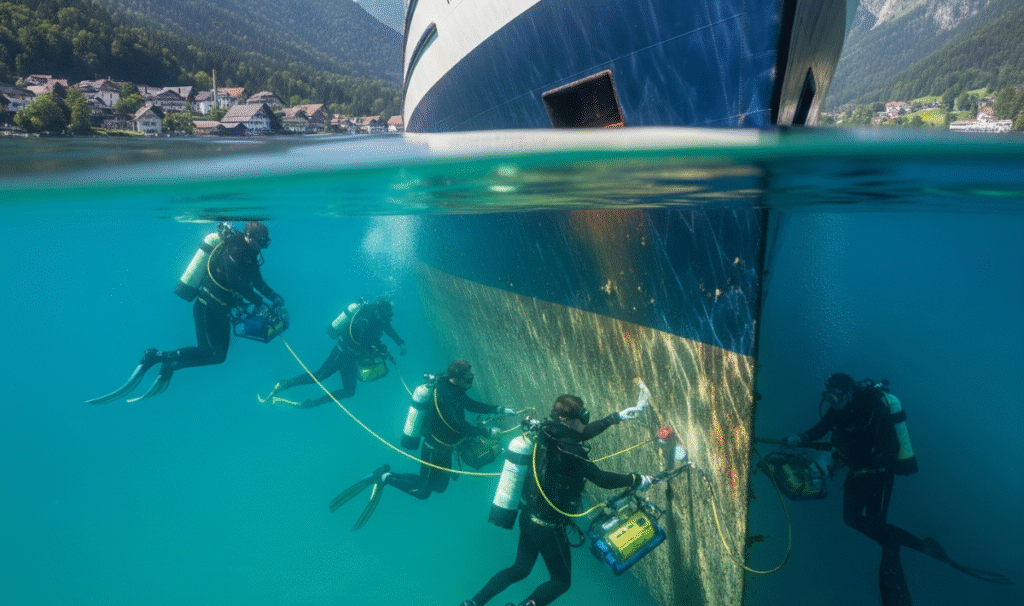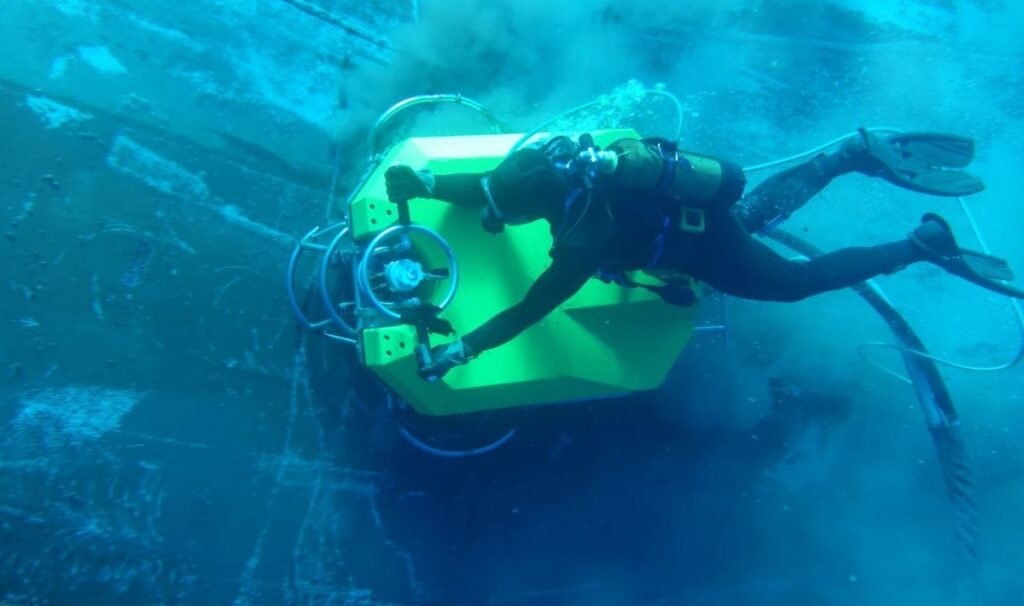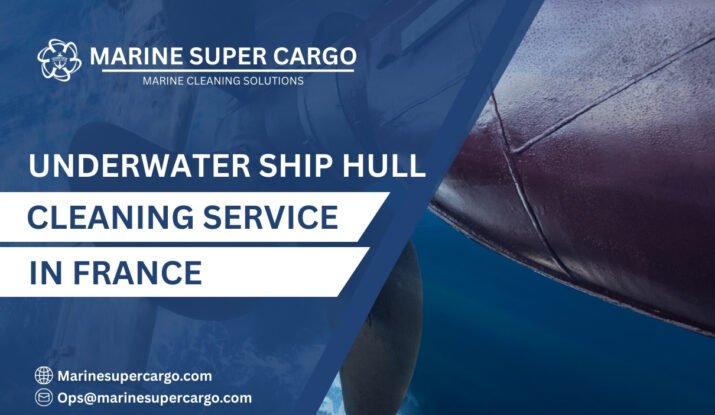Let’s picture this: the sun is gleaming off the azure French coast, ships glide into Marseille or Le Havre, their hulls sparkling. Yet beneath those shimmering surfaces, dangerous risks lurk—that few shipowners, operators, or even environmental advocates fully grasp. Ready to go deeper? Join me as we uncover the underwater ship hull cleaning in France—because what you don’t know beneath the surface can hurt your vessel, your bottom line, and the blue world we all cherish.
We often marvel at ships, their cargo, and the romance of the sea, rarely thinking about what clings to their underbellies. Yet regular hull cleaning in France has become non-negotiable as regulations tighten and performance demands soar. But alongside the many benefits, there are serious—sometimes shocking—risks. Let’s break them down together.
Why Do We Clean Ship Hulls Underwater?
Biofouling—the accumulation of algae, barnacles, and micro-organisms—can turn a streamlined vessel into a sluggish barge. Fuel bills climb. Schedules slip. Regulations demand clean hulls for both efficiency and environmental reasons. In-water cleaning is attractive: it’s faster and skips dry-dock costs. But as we’ll see, the underwater ship hull cleaning in France can make shortcuts very costly indeed.
Environmental Contamination—France’s Blue Waters at Stake
Here’s a harsh reality: scrubbing hulls underwater does more than remove marine gunk. It dislodges antifouling paint flakes—often laced with biocides or heavy metals—and all that alien biomass. In some French ports, regulations are so strict precisely because debris can poison ecosystems, or let invasive species hitch a ride and multiply in new harbors.
International Maritime Organization (IMO) and MARPOL Convention guidelines warn that careless cleaning practices introduce toxins and invaders into fragile marine environments. France, home to sensitive seagrass meadows and thriving fisheries, faces amplified risk.

Threat to Marine Biodiversity and Tourism
Each plume of debris risks more than fines—it threatens dolphins, turtles, sea grasses, and jobs tied to France’s prized coastal tourism. The underwater ship hull cleaning in France doesn’t just haunt captains. They can ripple through local communities, fisheries, and reputations.
Hull Damage and Safety Hazards—The Cost No One Talks About
Anti-fouling Coating Abrasion and Corrosion
Hull cleaning requires precision and expertise. When aggressive brushing or poor techniques are used, expensive anti-fouling coatings can be damaged, leaving the hull’s metal exposed. This leads to faster corrosion, increased drag, higher fuel consumption, and, in worst cases, costly structural repairs. In France, challenges often arise when service providers lack proper training or advanced tools. To safeguard vessels, many shipowners turn to specialists who follow international best practices, such as those recommended by marinesupercargo.com, ensuring safe, efficient underwater ship hull cleaning in France.
Diver and Equipment Dangers
Let’s not forget the human factor. Divers face murky visibility, cold, strong currents, and entanglement risks. There have been shocking accidents—including injuries and fatalities—when things go wrong. Even the best teams in France must deal with sudden weather shifts or hidden hazards, challenging even the most advanced equipment. imca-int.com training and certification save lives, but the risk never vanishes.
Port State Inspections and Fines
Port authorities conduct surprise inspections. Violations can mean heavy fines, detentions, or blacklisting. One of the underwater ship hull cleaning in France is simply failing to anticipate these strict checks, and not having proof of compliant, safe cleaning procedures.
Best Practices to Reduce the Underwater Ship Hull Cleaning in France
How do smart shipowners and managers avoid catastrophe?
- Select only certified, experienced service providers.
- Use eco-friendly, debris-collecting cleaning systems that comply with MARPOL and IMO advice.
- Always pre-inspect for coating integrity and environmental risk.
- Train all personnel to IMCA and local French safety standards.
These actions are your best antidote to the underwater ship hull cleaning in France.

The Role of International Standards: MARPOL, IMO, and IMCA
- Regulatory sources like the Marine Insight – MARPOL Convention provide key compliance blueprints for underwater cleaning worldwide.
- imo.org details eco-protection and safe in-water cleaning protocols.
- imca-int.com sets global diver safety and process standards.
France enforces and often exceeds these rules for any underwater ship hull cleaning.
What Makes France a Special Case?
France stands out in Europe for its highly sensitive and strictly regulated maritime zones. From the Côte d’Azur to Normandy, ports enforce additional rules and best practices that shipowners must follow to balance commerce with environmental preservation. In these waters, fouled hulls are not just inefficient—they can also breach regulations and harm fragile ecosystems. That’s why underwater ship hull cleaning in France, carried out by trusted specialists such as CleanShip.co, is essential for maintaining compliance, protecting the environment, and ensuring smooth, efficient voyages.
Conclusion:
Underwater hull cleaning in France is no stroll along the shore. The underwater ship hull cleaning in France—environmental fallout, hull and diver safety, and legal obstacles—demand attention, expertise, and solutions. With ever-stricter regulations and public scrutiny, only the best-prepared fleets can navigate these risks and keep sailing with confidence. Lean into international best practices, pick the right partners, and your hull will not only gleam but glide safely past trouble.
FAQ:
Q1. Can I clean my ship’s hull anywhere in France?
No. Many French ports restrict or ban underwater cleaning to protect wildlife. Always check local maritime authority guidelines before starting.
Q2. What fines could I face for illegal hull cleaning?
Penalties can reach tens of thousands of euros, with added risks of detentions and lost insurance coverage for non-compliance with the 3 Shocking Risks of underwater ship hull cleaning in France.
Q3. How can I reduce environmental risks?
Hire certified companies using debris-capturing tech, and ensure all practices comply with IMO/MARPOL standards and local French law.
Q4. What makes underwater hull cleaning more risky in France than in other regions?
France’s strict ecological rules and dense biodiversity hot spots mean even small mistakes can have greater environmental and regulatory consequences.
Q5. Is diver safety a concern during hull cleaning?
Absolutely. Strong currents, poor visibility, and equipment hazards make diver training (IMCA) and real-time safety protocols vital for all underwater cleaning in France.


